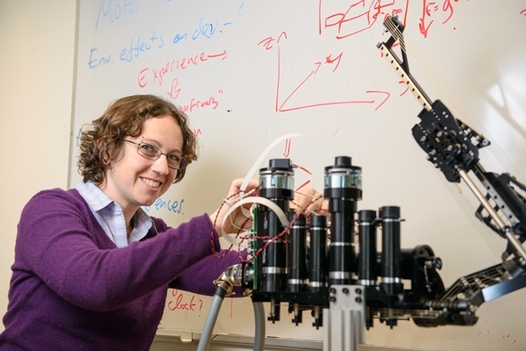
“The Marker”, Israel’s leading financial website and financial supplement, recently published a list of the ”40 Most Promising Young People of 2015”.
Featured in the list in the section on researchers is Dr. Ilana Nisky from BGU’s Department of Biomedical Engineering and head of the Biomedical Robotics Lab. Nisky received her B.Sc. (honors), M.Sc. (honors), and Ph.D. in Biomedical Engineering from BGU’s Department of Biomedical Engineering in 2006, 2009, and 2011, respectively. She was previously a postdoctoral research fellow in the Department of Mechanical Engineering at Stanford University in the U.S. Her research interests include human motor control, haptics, robotics, human and machine learning, teleoperation, and robot-assisted surgery. She is a member of IEEE, the Society for the Neural Control of Movement, the Society for Neuroscience, Technical Committee on Haptics, and an Executive Committee member of the Eurohaptics Society.
Dr. Nisky has won an array of awards including the European Commission FP7 Marie Curie International Outgoing Fellowship (2012), the Weizmann Institute of Science National Postdoctoral Award for Advancing Women in Science (2011) and the Wolf Scholarship Award for Excellent Doctoral Students (2010). Her research is funded today by the Israel Science Foundation, and the Binational Science Foundation.
The Marker piece reads as follows:
“Ilana Nisky, Senior Lecturer in the Department of Biomedical Engineering and head of the Biomedical Robotics Lab at Ben-Gurion University of the Negev.
A year ago, shortly after returning to Israel after completing a postdoctoral fellowship at Stanford University, Dr. Ilana Nisky established the Biomedical Robotics Lab at the University, which uniquely combines neuroscience, robotics and control theory. Returning to the University in Beer-Sheva came naturally to her after completing her three degrees in their Department of Biomedical Engineering.
Nisky's research, which has won numerous awards and research grants, utilizes an understanding of movement control processes and perception in the mind of the physician, in order to develop software that controls innovative medical robots that assist physicians. This interdisciplinary research combines engineering, medicine and brain research, and the ultimate aim is to develop efficient and intelligent robots more advanced than those in service today. An optimal combination of the robot in the doctor’s work will lead to improvement of the quality of treatment for patients and shortening the training of surgeons to use the robot and the financial implications derived from this are enormous. Improving the quality of training of doctors and the robotic tools that serve them will result in fewer failures and mistakes occurring.
A research breakthrough took place in the Lab this year in understanding how the time difference (delay) between touching an object and the feeling that this touch triggers affects us. Nisky and student Raz Leib found this time gap affects our perception, but does not impair motor action involved when touching the object.
This understanding, there is a gap between acting and perceiving, helps the team build the most suitable systems for the use of the physicians. In the future, such advanced robotic systems will allow the performing of complex surgeries that integrate robotic technology that require the surgeon to feel the touch of a patient's tissue, even when the doctor is thousands of miles away.”
Also featured in the list is Roy Elbaz, CEO of Pango, who completed his MBA at BGU.
Read the article the ”40 Most Promising Young People of 2015” (in Hebrew)
